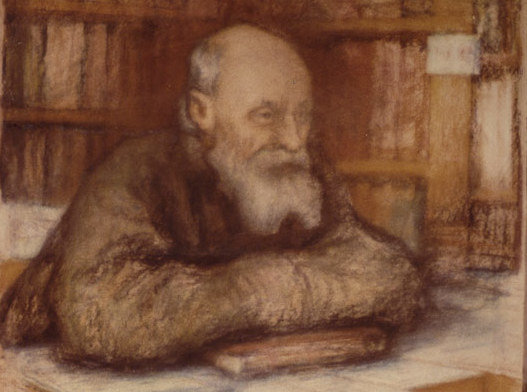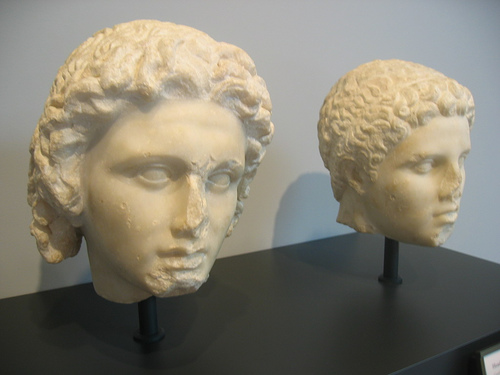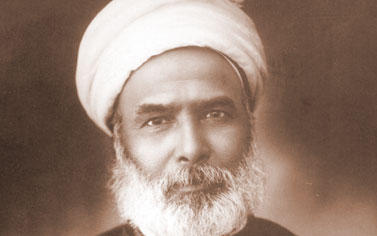 History
History  History
History  Food
Food 10 Weird Foods Inspired by Your Favorite Movies
 Religion
Religion 10 Mind-Blowing Claims and Messages Hidden in the Bible Code
 Facts
Facts 10 Things You Never Knew about the History of Gambling
 Weird Stuff
Weird Stuff 10 Cool and Creepy Facts about Collecting Tears
 Humans
Humans The Ten Most Lethal Gunslingers of the Old West
 Misconceptions
Misconceptions 10 Phony Myths and Urban Legends That Just Won’t Die
 History
History 10 Amazing Roman Epitaphs
 Weird Stuff
Weird Stuff 10 Niche Subcultures That Are More Popular Than You Might Think
 Mysteries
Mysteries 10 Tragic Disappearances and Deaths in Joshua Tree National Park
 History
History Top 10 Tragic Facts about England’s 9 Days Queen
 Food
Food 10 Weird Foods Inspired by Your Favorite Movies
 Religion
Religion 10 Mind-Blowing Claims and Messages Hidden in the Bible Code
Who's Behind Listverse?

Jamie Frater
Head Editor
Jamie founded Listverse due to an insatiable desire to share fascinating, obscure, and bizarre facts. He has been a guest speaker on numerous national radio and television stations and is a five time published author.
More About Us Facts
Facts 10 Things You Never Knew about the History of Gambling
 Weird Stuff
Weird Stuff 10 Cool and Creepy Facts about Collecting Tears
 Humans
Humans The Ten Most Lethal Gunslingers of the Old West
 Misconceptions
Misconceptions 10 Phony Myths and Urban Legends That Just Won’t Die
 History
History 10 Amazing Roman Epitaphs
 Weird Stuff
Weird Stuff 10 Niche Subcultures That Are More Popular Than You Might Think
 Mysteries
Mysteries 10 Tragic Disappearances and Deaths in Joshua Tree National Park
10 Completely Unorthodox Systems Of Morality
Some believe that God’s law defines right and wrong. Others believe that correct action is that which respects human life and follows principles of justice or virtue. Still others contend that actions can only be judged by their outcome. Moral relativism holds that morality is relative to the culture which produces it and that no universal principles of right or wrong can exist. But some morality systems, from our point of view, are just downright bizarre.
10Yangism

The philosopher Yangzi, from the fourth century BC, left no surviving works, meaning that his ideas must be gleaned from hostile critiques and semi-mythological tales. According to these limited sources, Yangzi believed that human beings should only ever do what is in their self-interest or the interest of their family and close friends. Under the philosophy of wei wo (“everything for myself”), Yangzi emphasized the importance of sustaining your own life, staying genuine to yourself, and avoiding entanglement in external affairs.
Yangists believed that an individual should strive for a long and healthy life, while avoiding overindulgence in sensory pleasures (which are generally damaging to long-term health). Yangzi himself was described as a man who would “not give one hair of his shin for the great profit of the world,” instead believing that no external possession was worth personal risk, and nothing, not even the throne, was worth risking your life. While political involvement might lead to benefits (such as wealth and status), the Yangists still viewed it as a risky move, and therefore not worth it. Yangzi also believed working for the good of society was foolish, since it’s not possible to have a relationship with all of society. Living life for the sake of abstract and noble ideals alienates an individual from what is really important—those close to you.
The noted scholar A.C. Graham, who reconstructed much of the Yangist philosophy from the remaining fragmentary sources, characterized it thusly: “[Yangism’s] question is not ‘How shall we benefit the world?’, but ‘What is truly beneficial to man?’, more specifically, ‘What is truly beneficial to myself?’ Is it wealth and power, as the vulgar suppose? Or the life and care of the body and the satisfaction of the senses?’ The Mohists cared only for the useful, the Yangists asked ‘Useful for what?’” Contemporary critics saw Yangism as selfish egoism, but the Yangists argued that higher ideals are fictions, which feed our own egos with no real benefit to anyone. Better to keep your own house in order than attempt to save a world that is beyond anyone’s ability to control.
9Antinomianism

Meaning “against the law,” antinomianism is the belief that Christians who have been saved are not constrained by any kind of moral law. Some early Gnostic Christians believed that being saved through Christ meant that they didn’t need to obey the laws of the Old Testament, with neither good nor bad deeds having any bearing on salvation. These early groups included the Simonians, who believed that nothing was truly good or bad, and the Carpocratians, who believed undergoing every possible human experience would help them become like Jesus. The early Christian thinker Marcion believed that Old Testament law was given by the evil god known as the Demiurge, while the Gospels came from the good god through Jesus Christ.
The Catholic Church declared antinomianism heretical, since it held that humans can achieve sinlessness, that the rituals and structures of religion are dispensable, and that we are no longer subject to the law of God or the Church. However, a series of related beliefs emerged during the Protestant Reformation. Martin Luther’s would-be disciple, Johann Agricola, wrote that divine grace freed Christians from the need to obey civil laws. (Luther responded with a blistering refutation entitled “Against the Antinomians.”)
In 17th-century England, the term was applied to those who downplayed the importance of moral law, such as John Eaton, whose book, The Honey-Combe Of Free Justification, argued that divine grace was received without conditions, making civil law a “hypocriticall legall holinesse.” In 1638, the radical religious leader Anne Hutchinson was thrown out of Massachusetts for preaching that a personal relationship with God was more important than the moral teachings of the Bible. As one of the oldest Christian heresies, antinomianism remains alive today, albeit mostly as an insult toward those whose theology you disagree with.
8Desirism

Philosopher Joel Marks thinks morality, a set of rules that we are impelled to obey, is overall a terrible idea. Morality makes us angry, hypocritical, imprudent, intransigent, and arrogant, and in the end it’s a useless guide to living unless you happen to be a philosopher who likes puzzles. Throwing any pretense to morality away, he argues, makes us more tolerant, guilt-free, interesting, and compassionate. The best way to live your life is to figure out what you really want, prioritize it, and then work out how to achieve those ends in a way that conforms to your list of priorities.
This is essentially the idea behind Desirism, originally developed by Alonzo Fyfe as “Desire Utilitarianism.” Desirism argues that desire is the only thing that really impels people to act. Morals are simply abstract concepts, but if people desire pleasure, happiness, or the welfare of their children, then they will seek to achieve them. However, some desires are better than others, in the sense that some desires better allow for our own satisfaction and the satisfaction of others. If a person is forced to choose between happiness and the welfare of their children, the desire they value the most will take precedence.
While other moral systems try to tell you the meaning of the good life, Desirism says that you have to work that out for yourself. A good desire is one that helps to bring about other desires, while a bad desire is one that tends to thwart other desires. Right action, therefore, is to do what a person with good desires would do. Morality is encouraging behavior in accordance with good desires and discouraging conduct reflecting desires that stymie other desires, eventually creating a “harmony of desires” in society. But even this isn’t intrinsically good. Intrisic values don’t exist, remember?
7Cosmism

In the late 19th century, the Russian mystic Nikolai Fyodorov decided that the lack of love in the world was a problem. He believed there were two kinds of non-loving relationships: alienation between people and the alienation of the living from the dead. Universal salvation lay in overcoming both of those obstacles.
Everything we do in the world inevitably leads to decay and death, so Fyodorov believed that we should collectively use our God-given intelligence to counter natural death. This would mean achieving immortality by taming the body as a biological system, and then regulating natural disasters by taming the Earth itself. Human evolution, meanwhile, would be directed toward self-feeding through chemical processes, similar to plants and algae. The next step, naturally, was resurrecting the dead by traveling into space to collect their particles and reconstituting the forms of everybody who has ever existed.
Cosmism was a vision of universal salvation through physical resurrection, far preferable to a universe where some suffered the torments of hell and others the ecstasies of heaven. The question of where to put all these resurrected people was easily answered by colonizing uninhabited planets, a process Fydorov called the “spiritualization” of the universe. He argued that resurrecting the dead and escaping the Earth was the only way the human race could avoid cannibalism, because we currently cannot avoid living off the dust and works of our ancestors.
Being a 19th-century Russian, Fyodorov wasn’t entirely clear on how any of this could be technically achieved, but he was sure that the collective effort of mankind would be sufficient to accomplish it. Fyodorov’s ideas of life-extension, immortality, directed evolution, and space travel were a huge influence on the modern transhumanist movement. Today, the ideas espoused by the Russian cosmists, with their Orthodox background and ethos, have been adopted by a new generation of secular researchers seeking to extend human life, upload human minds into computers, and expand across the galaxy.
6Homonoia

The ancient Greeks were known for their violent and fragmented city-state politics, and their dismissal of all non-Greeks as barbarians. The philosophy of homonoia (meaning “oneness of mind” or “concord”) turned that on its head, taking the idea of philia, or brotherly love, and expanding it beyond relations with friends. It was first applied within the city-states themselves, where philosophers such as Demosthenes supported the idea that all citizens of a city-state should subsume their social and political differences in the collective interest, creating a polity of one mind and one will.
The concept was expanded at the end of the Peloponnesian War, when the Greeks pledged allegiance to the idea. Obviously, this initially only applied to the Greeks themselves, with Aristotle supposedly telling Alexander the Great to “treat Greeks as friends and family, but barbarians as animals and plants.” The philosopher Isocrates actually believed that homonoia could only be achieved by posing an external barbarian threat to keep the Greeks united. But Alexander apparently had other ideas, with Eratosthenes writing that “Alexander believed he had a mission from the deity to harmonize men generally and be the reconciler of the world, mixing men’s lives and customs as in a loving cup, and treating the good as his kin, the bad as strangers; for he thought that the good man was the real Greek, and the bad man the real barbarian.”
5Deep Ecology

Dismissing the human-centric worldview of modern civilization, advocates of deep ecology believe that we need to develop a moral system that recognizes the value inherent in nature. Norwegian environmentalist Arne Naess invented the term in his 1973 article: “The Shallow And The Deep, Long-Range Ecology Movement.” Naess criticized the “shallow” reform approach, which sought to preserve the wilderness and biodiversity primarily for the benefit of humanity. Deep Ecology, by contrast, he characterized as a major change in how we relate to the natural world, a “substantial reorientation of our whole civilization.”
Deep ecology advocates biocentric egalitarianism, which dismisses the idea that humans have a higher value than other organisms, asserting that all living organisms have equal value and right to life. The complexity or level of intelligence in an organism is irrelevant. Another Deep Ecology tenet is metaphysical holism, the idea that there is no real division between the human and the non-human worlds and that humans must achieve a form of enlightenment where they identify the self with the biosphere as a whole. Or, as activist John Seed describes it: “‘I am protecting the rain forest’ develops into ‘I am part of the rain forest protecting myself.’”
Naess believed that this type of self-realization did not need a moral dimension: “Just as we do not need morals to make us breathe . . . so if your ‘self’ in the wide sense embraces another being, you need no moral exhortation to show care . . . you care for yourself without feeling any moral pressure to do it.” Other Deep Ecology advocates agree, describing the movement as a fundamentally non-moral one, seeking to protect the biosphere out of the natural inclination for self-preservation. Others disagree, instead arguing that developing a Deep Ecology self is a necessary prerequisite to becoming a truly moral being.
4Satanism

Satanism has a moral system typical of other Left Hand Path movements, such as Thelema, Tantric Magick, and Chaos Magick. The “Left Hand Path” name was borrowed from the Indian Tantric tradition, which was reinvented in the Western occult tradition by Madame Blavatsky in the 19th century. Left Hand Path philosophies are highly individualistic, with an emphasis on free thought and moral relativism.
Satanism in particular believes that morality is something that must be decided by each individual, dismissing the legalistic moral structures of traditional philosophies. Instead of the usual moral commandments, Satanism has guidelines based on self-preservation and the law of retribution, meaning taking merciless revenge on those who slight you. The self is all-important to Satanism: “Discovering what one likes, standing up for one’s right to like it, and pursuing that desire is among the most sacred of tasks.” The cardinal sin is stupidity, and other Satanic sins, such as arrogance, lack of compassion, herd mentality, self-deceit, and failure to learn from mistakes, are all considered the result of stupidity.
Anton LeVey, the founder of Satanism, even argued that the sins of Christianity were actually virtues. He developed a simple, tribal morality system: You have the right and responsibility to survive and thrive. Mind your own affairs as much as possible, but if someone hinders your ability to live and survive, you are within your rights to destroy them. Those closest to you are of a higher moral worth than strangers. Their basic motto is: “As long as it harms no-one undeserving, do as you will.” Satanism is essentially atheistic, but moves beyond a simple unbelief in God to an emphasis on self-deification, the idea of worshipping yourself as the God of your own personal universe.
3Liberal Islam

The popular view of Islam in the West often fails to reflect the rich history of Islamic liberalism. In the 19th and early 20th centuries, an influential group of liberals known as the Young Ottomans (not to be confused with the similarly named Young Turks) sought to import Western liberal democracy and adapt it for the Islamic context. In 1868, the Turkish intellectual Namik Kemal wrote: “Being created free by Allah, man is naturally obliged to benefit from this divine gift. [Thus] state authority should be realized in the way which will least limit the freedom of the individual.” These ideas helped bring about reforms that limited the power of the Sultan, protected the rights of citizens, and gave equality to religious and ethnic minorities. In the same period, Egyptian scholar Muhammad Abduh (pictured above) referred to the society of Paris as “Islam without Muslims,” believing that the liberal West exemplified the very traits that should exist in an Islamic society.
The collapse of the Ottoman Empire and the arrival of European colonialism and secular authoritarianism in the Middle East saw the nascent Islamic liberalism swept away, as Islamic fundamentalism gradually became the rallying cry of the oppressed. But the ideas have never entirely gone away. The basis of liberal Islam is the tradition of ijtihad, the reasoned interpretation of the Quran and hadith. The idea is that the Quran and other Islamic texts were written in response to very specific conditions and could be easily misapplied if taken literally. Therefore, it is necessary to understand the underlying meaning and message behind the texts and apply those teachings to changing social conditions. This was the common practice until at least the 1500s, when more conservative and literalist interpretations began to take hold.
Some liberal Muslims even dismiss the concept of Islamic Law, based on a reading of one of the Quran’s most famous verses: “There shall be no compulsion in religion: the right way is now distinct from the wrong way.” If the Quran dismisses legalism, then the laws of Muhammad are merely statements of ethics, and not the same as the divine law.
2Aghora
Aghora derives from the Sanskrit word ghora, meaning darkness or fear, but expresses the opposite meaning, usually interpreted as “illumination” or “awareness.” It represents the most extreme form of Tantra, a set of practices aimed at achieving spiritual enlightenment. The Aghori sadhus (holy men) believe in indifference to the world, which they achieve through an openness to their own lower natures. While other sadhus are forbidden from engaging in sex, eating meat, or drinking alcohol, Aghori sadhus eat meat, smoke marijuana, drink liquor, and engage in ritual copulation with prostitutes. In fact, they eat anything, including human flesh, feces, urine, bodily fluids, carrion, and the ashes from funeral pyres. They believe this reflects the oneness of everything and helps to break the illusion of reality.
The Aghori also believe that close association with death will rid them of the fear of it, weakening the cosmic illusion. Thus, they perform a great number of their rituals in cemetery grounds, cover themselves in cremation ash, and drink from human skulls. The aim of these rituals (to understand true reality) is the same as those of other sadhus, and the Aghori possess great discipline and control of body and mind. Without these qualities, it is said, their practices would lead to their destruction, but the Aghori instead penetrate so far into the darkness that they emerge in the light. Still, many people have an extremely negative opinion of the Aghori, and they have been accused of black magic and human sacrifice. However, Aghoris have also been notable for their social activism, such as support for sufferers of leprosy. The extreme order has begun to attract followers from the West.
1Discordianism

Discordianism has been described as a joke disguised as a religion, but also as a religion disguised as a joke. It began in the 1960s, with the publication of its holy text: Principia Discordia: Or How I Found The Goddess And What I Did To Her Once I Found Her.
The Discordians worship Eris, the Greco-Roman goddess of chaos, and hold free thought as their most important value, claiming that freedom is the only obligation of mankind. There is no such thing as a universal moral wrong, since such a concept would impinge on freedom. By extension, natural rights also don’t exist, since the existence of rights implies that some things are not rights, which, again, impinges on freedom. The morality of an action is based on the freedom inherent in that action, and therefore the consequences of an action are irrelevant to its ethics. Discordianism also holds that introducing confusion and disorder into society creates the conditions for freedom and thought: “Confusion causes people to think. Thinking is good. Confusion is good.”
Discordianism is highly critical of the so-called Golden Rule, Western philosophy’s recurring moral theme of “do unto others as you would have others do unto you.” According to this logic, say Discordians, you could justify doing almost anything to anyone. The faith does suggest some loose moral guidelines and indications of correct behavior, but Discordianism dismisses the idea of universal moral imperatives, believing that morality is relative, based on human cultural constructs, and ultimately up to the individual. The Summa Discordia wraps it up succinctly: “Goddess forbids nothing, but nobody likes an asshole.”
David Tormsen’s moral compass is lovely, when she’s not being mean. To tell him your moral code, send him a line at [email protected].






